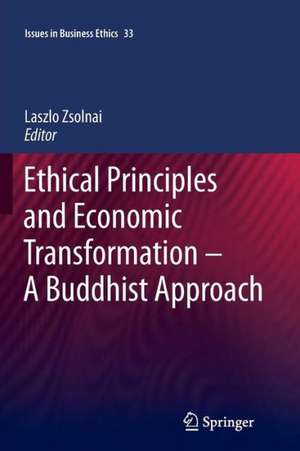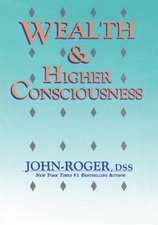Ethical Principles and Economic Transformation - A Buddhist Approach: Issues in Business Ethics, cartea 33
Editat de Laszlo Zsolnaien Limba Engleză Paperback – 15 iul 2013
Happiness research convincingly shows that not material wealth but the richness of personal relationships determines happiness. Not things, but people make people happy. Western economics tries to provide people with happiness by supplying enormous quantities of things and today’s dominating business models are based on and cultivates narrow self-centeredness.But what people need are caring relationships and generosity. Buddhist economics makes these values accessible by direct provision. Peace can be achieved in nonviolent ways. Wanting less can substantially contribute to this endeavor and make it happen more easily. Permanence, or ecological sustainability, requires a drastic cutback in the present level of consumption and production globally. This reduction should not be an inconvenient exercise of self-sacrifice. In the noble ethos of reducing suffering it can be a positive development path for humanity.
| Toate formatele și edițiile | Preț | Express |
|---|---|---|
| Paperback (1) | 637.28 lei 6-8 săpt. | |
| SPRINGER NETHERLANDS – 15 iul 2013 | 637.28 lei 6-8 săpt. | |
| Hardback (1) | 642.51 lei 6-8 săpt. | |
| SPRINGER NETHERLANDS – 19 mai 2011 | 642.51 lei 6-8 săpt. |
Din seria Issues in Business Ethics
- 17%
 Preț: 364.74 lei
Preț: 364.74 lei -
 Preț: 420.97 lei
Preț: 420.97 lei - 15%
 Preț: 499.26 lei
Preț: 499.26 lei - 15%
 Preț: 644.63 lei
Preț: 644.63 lei -
 Preț: 385.84 lei
Preț: 385.84 lei - 15%
 Preț: 730.86 lei
Preț: 730.86 lei - 20%
 Preț: 517.09 lei
Preț: 517.09 lei - 15%
 Preț: 598.50 lei
Preț: 598.50 lei - 15%
 Preț: 645.60 lei
Preț: 645.60 lei - 18%
 Preț: 1220.88 lei
Preț: 1220.88 lei - 18%
 Preț: 953.03 lei
Preț: 953.03 lei - 15%
 Preț: 643.99 lei
Preț: 643.99 lei - 15%
 Preț: 644.82 lei
Preț: 644.82 lei - 15%
 Preț: 639.73 lei
Preț: 639.73 lei - 15%
 Preț: 635.96 lei
Preț: 635.96 lei - 20%
 Preț: 558.32 lei
Preț: 558.32 lei - 15%
 Preț: 640.55 lei
Preț: 640.55 lei - 15%
 Preț: 644.49 lei
Preț: 644.49 lei - 18%
 Preț: 772.93 lei
Preț: 772.93 lei - 15%
 Preț: 637.59 lei
Preț: 637.59 lei - 15%
 Preț: 643.99 lei
Preț: 643.99 lei - 15%
 Preț: 644.82 lei
Preț: 644.82 lei - 15%
 Preț: 700.61 lei
Preț: 700.61 lei - 5%
 Preț: 1098.27 lei
Preț: 1098.27 lei - 15%
 Preț: 646.43 lei
Preț: 646.43 lei - 15%
 Preț: 643.99 lei
Preț: 643.99 lei - 18%
 Preț: 952.89 lei
Preț: 952.89 lei - 15%
 Preț: 641.38 lei
Preț: 641.38 lei
Preț: 637.28 lei
Preț vechi: 749.73 lei
-15% Nou
Puncte Express: 956
Preț estimativ în valută:
121.96€ • 127.17$ • 101.36£
121.96€ • 127.17$ • 101.36£
Carte tipărită la comandă
Livrare economică 21 martie-04 aprilie
Preluare comenzi: 021 569.72.76
Specificații
ISBN-13: 9789400736153
ISBN-10: 9400736150
Pagini: 228
Ilustrații: XII, 216 p.
Dimensiuni: 155 x 235 x 12 mm
Greutate: 0.33 kg
Ediția:2011
Editura: SPRINGER NETHERLANDS
Colecția Springer
Seria Issues in Business Ethics
Locul publicării:Dordrecht, Netherlands
ISBN-10: 9400736150
Pagini: 228
Ilustrații: XII, 216 p.
Dimensiuni: 155 x 235 x 12 mm
Greutate: 0.33 kg
Ediția:2011
Editura: SPRINGER NETHERLANDS
Colecția Springer
Seria Issues in Business Ethics
Locul publicării:Dordrecht, Netherlands
Public țintă
ResearchCuprins
Preface.- Acknowledgement.-Introduction.- Why Buddhist Economics? Laszlo Zsolnai.- Part 1 Buddhist EthicsApplied to Economics.- The Relational Economy; Julie A. Nelson.- Buddhism andSustainable Consumption; Peter Daniels.- Economic Sufficiency and Santi Asoke; Julia Essen.- Pathways to aMindful Economy; Joel C. Magnuson.- Part 2 Achieving Happiness and Peace.- DoOur Economic Choices Make Us Happy? Colin Ash.- Gross National Happiness; SanderTideman.- The Application of Buddhist Theory andPractice in Modern Organizations; Bronwen Rees and Tamas Agocs.- Leadershipthe Buddhist Way; Laurens van den Muyzenberg.- Conclusion.- The Contributionsof Buddhist Economics; Laszlo Zsolnai. Bibliography of Buddhist Economics.- About the Authors.- Index.
Recenzii
“I largely agree with the values expressed by the contributors to this collection. … Taken together the work demonstrates that Buddhist economics is still very much a work in progress.” (Richard K. Payne, Pacific World - Journal of the Institute of Buddhist Studies, Vol. 4 (1), 2020)
Textul de pe ultima copertă
Buddhism points out that emphasizing individuality and promoting the greatest fulfillment of the desires of the individual conjointly lead to destruction. The book promotes the basic value-choices of Buddhism, namely happiness, peace and permanence.
Happiness research convincingly shows that not material wealth but the richness of personal relationships determines happiness. Not things, but people make people happy. Western economics tries to provide people with happiness by supplying enormous quantities of things and today’s dominating business models are based on and cultivates narrow self-centeredness.But what people need are caring relationships and generosity. Buddhist economics makes these values accessible by direct provision. Peace can be achieved in nonviolent ways. Wanting less can substantially contribute to this endeavor and make it happen more easily. Permanence, or ecological sustainability, requires a drastic cutback in the present level of consumption and production globally. This reduction should not be an inconvenient exercise of self-sacrifice. In the noble ethos of reducing suffering it can be a positive development path for humanity.
Happiness research convincingly shows that not material wealth but the richness of personal relationships determines happiness. Not things, but people make people happy. Western economics tries to provide people with happiness by supplying enormous quantities of things and today’s dominating business models are based on and cultivates narrow self-centeredness.But what people need are caring relationships and generosity. Buddhist economics makes these values accessible by direct provision. Peace can be achieved in nonviolent ways. Wanting less can substantially contribute to this endeavor and make it happen more easily. Permanence, or ecological sustainability, requires a drastic cutback in the present level of consumption and production globally. This reduction should not be an inconvenient exercise of self-sacrifice. In the noble ethos of reducing suffering it can be a positive development path for humanity.
Caracteristici
The most comprehensive presentation yet of the Buddhist approach to economics and business Cutting edge research in CSR shows the relevance of Buddhism's promotion of cooperation, care and generosity Highlights one of the most popular and fast-growing trends in the USA, Western Europe and Japan

















